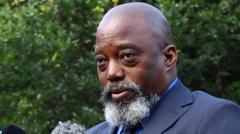The former leader, who was in power from 2001 until 2019, criticized the current Congolese government, labeling it a "dictatorship," and signaled his intent to engage with the ongoing conflict that has plagued the country. He led the country for 18 years after taking over from his assassinated father, Laurent Kabila, and handed over power to President Félix Tshisekedi, with whom he eventually had a falling out.
Upon arrival, Kabila was welcomed by local party members and representatives of the M23, who expressed a desire for his full participation in the nation. A youth leader from Kabila's People's Party for Reconstruction and Democracy (PPRD) shared sentiments that Kabila's return was akin to a father coming home to his children. However, the PPRD faced a ban in the capital, Kinshasa, from officials who accused them of being ambiguous regarding the M23’s territorial claims.
Congolese authorities, meanwhile, contend that Kabila is linked to war crimes and treason against the state, with claims of substantial evidence connecting him to the M23. Kabila has been living in South Africa for two years but indicated last month his wish to return and aid in resolving the ongoing conflict.
The relationship between the M23 and the Congolese government continues to be volatile. Fighting between the armed group and the Congolese army first ignited in 2012 and resumed in earnest in 2021. The M23 has made significant territorial gains in recent months, exacerbating the humanitarian crisis and displacing thousands of people across the region.
This return heralds uncertain political dynamics in the Eastern DRC as both local and international observers closely monitor the implications of Kabila's presence in a country rife with entrenched divisions and ongoing conflict.
Upon arrival, Kabila was welcomed by local party members and representatives of the M23, who expressed a desire for his full participation in the nation. A youth leader from Kabila's People's Party for Reconstruction and Democracy (PPRD) shared sentiments that Kabila's return was akin to a father coming home to his children. However, the PPRD faced a ban in the capital, Kinshasa, from officials who accused them of being ambiguous regarding the M23’s territorial claims.
Congolese authorities, meanwhile, contend that Kabila is linked to war crimes and treason against the state, with claims of substantial evidence connecting him to the M23. Kabila has been living in South Africa for two years but indicated last month his wish to return and aid in resolving the ongoing conflict.
The relationship between the M23 and the Congolese government continues to be volatile. Fighting between the armed group and the Congolese army first ignited in 2012 and resumed in earnest in 2021. The M23 has made significant territorial gains in recent months, exacerbating the humanitarian crisis and displacing thousands of people across the region.
This return heralds uncertain political dynamics in the Eastern DRC as both local and international observers closely monitor the implications of Kabila's presence in a country rife with entrenched divisions and ongoing conflict.





















